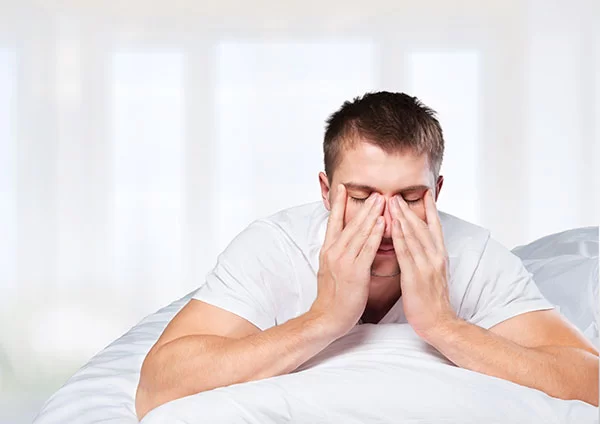Restoring Sleep and Health for a Better Tomorrow
Sleep apneais a widespread sleep disorder that impacts millions across the globe, including many in the Wilmington and Seaford communities. If you wake up feeling exhausted and unrested, it could be a sign of sleep apnea. Fortunately, you don’t have to continue suffering. Brown and Baran Family Dentistry offers advanced sleep apnea treatment in Wilmington and Seaford, ensuring you get the restorative sleep you deserve.
If you suspect sleep apnea is affecting your health, don’t wait to seek professional care. Schedule your appointment today with our dentists in Wilmington and Seaford, DE, by calling our Wilmington office at (302) 999-7600or our Seaford office at (302) 536-7589. We proudly welcome patients from Wilmington, Seaford, and the surrounding Delaware areas.
What is Sleep Apnea?
Sleep apneais a condition marked by interrupted breathing during sleep. It occurs when the muscles in the throat and mouth relax, leading to partial or complete airway blockage. This obstruction restricts airflow, causing breathing pauses lasting a few seconds to several minutes. These interruptions can happen multiple times throughout the night, severely disrupting sleep quality.
There are three types of sleep apnea:
- Obstructive Sleep Apnea (OSA):The most common form, OSA, occurs when throat muscles relax, blocking the airway.
- Central Sleep Apnea (CSA):CSA is less common and involves the brain failing to send correct signals to the muscles responsible for breathing.
- Complex Sleep Apnea Syndrome (CSAS):Also known as mixed sleep apnea, CSAS is both obstructive and central sleep apnea.
Symptoms of Sleep Apnea in Wilmington and Seaford Near You
Common symptoms of sleep apnea include:
- Loud snoring
- Pauses in breathing during sleep, which a bed partner often observes
- Excessive daytime sleepiness
- Morning headaches
- Difficulty concentrating
- Irritability
- Fatigue
- Frequent awakenings during the night to urinate (nocturia)
- Dry mouth or sore throat upon waking
If you’re experiencing these symptoms, contact our Wilmington or Seaford dental office today to schedule a consultation. Early diagnosis can significantly improve your quality of life.
Why Choose Brown and Baran Family Dentistry for Sleep Apnea Treatment?
At Brown and Baran Family Dentistry, Dr. Paul Brown and Dr. Chris Baran offer comprehensive dental solutions for sleep apnea that can transform your quality of life. Our doctors have advanced training in dental sleep medicine, providing custom-fitted oral appliances that are comfortable, effective, and more convenient than traditional CPAP machines. We work collaboratively with sleep physicians across Delaware to ensure integrated care tailored to your specific needs.
Using state-of-the-art technology at our Wilmington and Seaford locations, we create precise appliances that position your jaw optimally to maintain open airways during sleep. Our patients appreciate our thorough approach—from detailed consultations to follow-up adjustments that ensure maximum effectiveness. Choose Brown and Baran Family Dentistry for sleep apnea treatment that helps you breathe easier and sleep better.
To schedule your sleep apnea consultation, call our Wilmington office at (302) 999-7600 or our Seaford location at (302) 536-7589.
Causes of Sleep Apnea
There are various causes and risk factors for developing sleep apnea. These include:
- Gender: Men are at a higher risk, though the risk for women increases after menopause.
- Age: While more common in older adults, sleep apnea can affect all age groups, including children.
- Family History:A family history of sleep apnea may increase the risk.
- Alcohol and Sedative Use: The consumption of alcohol or sedative medications can relax throat muscles, increasing the risk of airway obstruction.
- Smoking: Smokers have a higher likelihood of developing sleep apnea due to increased inflammation in the airway.
- Nasal Congestion: Chronic nasal congestion can make breathing difficult, raising the risk of sleep apnea.
- Neck Circumference: A thicker neck may indicate a narrower airway, contributing to obstructive sleep apnea.
- Hormones: Conditions like pregnancy or polycystic ovary syndrome (PCOS) can elevate the risk of sleep apnea.
How Is Sleep Apnea Diagnosed at Our Wilmington and Seaford Dental Offices?
To obtain a sleep apnea diagnosis, you’ll likely experience the following:
- Physical Examination:Our team will examine your mouth, throat, and neck to identify any anatomical factors, such as enlarged tonsils, that may contribute to sleep apnea. If sleep apnea is suspected, we’ll refer you to a sleep specialist for further evaluation.
- Sleep Study:A polysomnography test, typically conducted overnight in a sleep lab or at home with portable monitoring devices, tracks your sleep patterns, brain activity, heart rate, and oxygen levels.
- Diagnosis: After analyzing the sleep study results, the sleep specialist will determine if you have sleep apnea. If diagnosed, you’ll return to our Wilmington or Seaford dental office to discuss a personalized treatment plan.
Sleep Apnea Treatments in Wilmington and Seaford Near You
There are various types of sleep apnea treatments available. We’ll go over your options and discuss which will be best suited to treat sleep apnea and meet your needs.
Continuous Positive Airway Pressure (CPAP) Therapy
CPAPis a widely used treatment for moderate-to-severe sleep apnea. It involves wearing a mask over the nose or mouth during sleep, which delivers a constant stream of pressurized air, keeping the airway open.
Oral Appliance Therapy
Custom-fitted oral appliances, similar to mouthguards, can be prescribed to reposition the jaw and tongue, preventing airway obstruction during sleep. At Brown and Baran Family Dentistry, we provide oral appliances for patients with sleep apnea. Contact our Wilmington office at (302) 999-7600 or our Seaford office at (302) 536-7589 to learn more about this sleep apnea treatment.
Lifestyle Modifications
Certain lifestyle changescan help alleviate sleep apnea symptoms. These may include maintaining a healthy weight, regular exercise, avoiding alcohol and sedatives, and sleeping on your side rather than on your back.
Mouth and Throat Exercises
Mouth and throat exercisescan be a useful complement to other treatments for mild cases of obstructive sleep apnea (OSA). These exercises strengthen the muscles in the mouth and throat, potentially reducing the severity of sleep apnea symptoms. However, these exercises may not be a standalone solution for moderate-to-severe OSA.
Surgical Interventions
In some cases, surgical optionsmay be considered to address anatomical issues contributing to sleep apnea. These include uvulopalatopharyngoplasty (UPPP), genioglossus advancement, or mandibular advancement surgery.

Frequently Asked Questions
While many people are surprised to learn that dentists treat sleep apnea, Dr. Brown and Dr. Baran are qualified to provide effective solutions. They create custom-fitted oral appliances that reposition your jaw and tongue to keep your airway open during sleep.
These dental devices are particularly effective for mild to moderate sleep apnea and for patients who can’t tolerate CPAP machines. At our Wilmington and Seaford locations, we take detailed impressions of your teeth to craft a comfortable appliance that fits your specific oral anatomy.
Our sleep apnea treatment process typically involves:
- Initial consultation and examination at either our Wilmington or Seaford location
- Coordination with your physician or a sleep specialist for proper diagnosis (if you haven’t already been diagnosed)
- Digital impressions of your teeth and jaw for creating your custom oral appliance
- Fitting appointment where Dr. Brown or Dr. Baran ensures proper fit and function
- Instructions on cleaning, maintenance, and usage
- Follow-up appointments to assess effectiveness and make any necessary adjustments
- Ongoing monitoring during regular dental checkups
This comprehensive approach ensures you receive the most effective treatment for your specific sleep apnea condition.
Most of our Delaware patients adjust to their oral appliance within 1-2 weeks. Initially, you might experience minor discomfort, excessive salivation, or temporary bite changes in the morning. Dr. Brown and Dr. Baran design appliances to minimize these effects and provide specific techniques to help you adapt more quickly.
Our doctors are available to address any concerns during the adjustment period, with convenient appointments at both our Wilmington and Seaford offices. Patients typically report that any initial discomfort is far outweighed by improved sleep quality, increased energy, and better overall health. Many describe the experience as life-changing once they’ve fully adjusted to their appliance.
For more information about sleep apnea treatment or to schedule a consultation, please contact Brown and Baran Family Dentistry at our Wilmington office: (302) 999-7600 or our Seaford office: (302) 536-7589.
Break Free from Sleep Apnea
Take control of your sleep and reclaim the restful nights you deserve by treating sleep apnea. It’s time to seek professional help and discover effective treatment options that make a significant difference. Contact our dental team today at our Wilmington office at (302) 999-7600or our Seaford office at(302) 536-7589to schedule an appointment.
Together, we can address your sleep apnea concerns, provide personalized care, and guide you toward a healthier, more revitalized life with better sleep. We proudly serve new and returning patients throughout Delaware and its surrounding areas.



